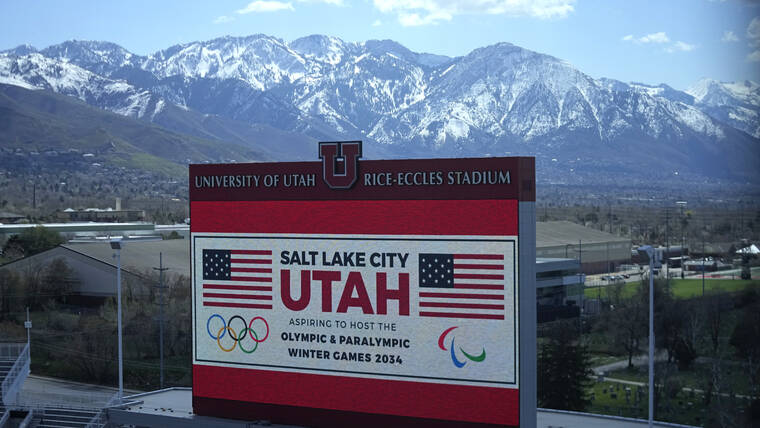SALT LAKE CITY — The International Olympic Committee was effusive in its support Wednesday for a decadeslong effort to bring back the Winter Games to Utah’s capital city in 2034.
Unlike so many other past hosts that have decided bringing back the Games isn’t worth the time, money or hassle, Salt Lake City remains one of the few places where Olympic fever still burns strong. Olympic officials praised the city for preserving facilities and public enthusiasm as they kicked off their final visit ahead of a formal announcement expected this July.
Reminders of the 2002 Winter Games are nestled throughout the city, from a towering cauldron overlooking the valley to an Olympic emblem stamped on manhole covers downtown. Leaving the airport, a can’t-miss arch amid snow-capped mountains shows visitors they’re entering an Olympic city.
Those remnants are part of a long-term strategy Utah leaders launched on the heels of their first Olympics to remind residents that the Games are part of the fabric of their city, and that being a host city is a point of pride.
Olympic officials said they were greeted with such excitement Wednesday that it felt like the 2002 Winter Games never ended.
In the decades since Salt Lake City first opened its nearby slopes to the world’s top winter athletes, the pool of potential hosts has shrunk dramatically. The sporting spectacular is a notorious money pit, and climate change has curtailed the number of sites capable of hosting.
Even though Salt Lake City got caught in a bribery scandal that nearly derailed the 2002 Winter Olympics, it has worked its way back into the good graces of an Olympic committee increasingly reliant on passionate communities as its options dwindle. The city is now a prime candidate if officials eventually form a permanent rotation of host cities, Olympic Games Executive Director Christophe Dubi told reporters.
“We are in an environment here where we look for opportunities more than concerns,” Dubi said. “For the next 10 years, we’re not so much looking at what is challenging, but what are the opportunities to work together.”
The committee was left with only two bid cities for 2022 — Beijing, China, and Almaty, Kazakhstan — after financial, political and public concerns led several European contenders to drop out.
“The International Olympic Committee needs Salt Lake City a lot more than Salt Lake City needs the International Olympic Committee, or the Olympics,” said Jules Boykoff, a sports and politics professor at Pacific University.
For Utah Gov. Spencer Cox, securing the bid is central to his goal of cementing the state as North America’s winter sports capital.
Cox has continued a long-running push by state leaders to beckon professional sports leagues and welcome international events like last year’s NBA All-Star Game that could help burnish its image as a sports and tourism mecca, while chipping away at a lingering stigma that Utah is a bizarre, hyper-religious place.
Unlike many cities, Salt Lake City leaders say their polling shows more than 80% approval statewide.



